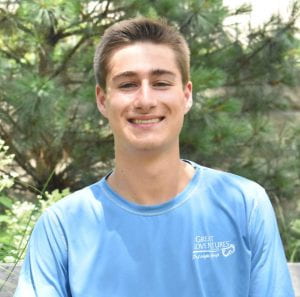 Tell us a bit about yourself!
Tell us a bit about yourself!
I grew up a few towns over from Northwestern University, where I’ve lived for my entire life until I ended up on the east coast for college. I’m currently a physics major at Dartmouth College, but outside of the classroom, I play the cello and love going for runs and hikes near campus.
What made you want to do astronomy research?
I’ve always enjoyed solving problems in physics, and I’ve also enjoyed learning about any and all phenomena which occur beyond the limits of our atmosphere. Astronomy seemed like the perfect combination of the two.
What was your Astronomy background before you came to work with Dr. Fong? What have you learned since?
I started working with Dr. Fong after my freshman year in college, and at that point, I’d taken a few physics classes but had no background in Astronomy. Since then, I’ve learned what gamma ray burst is and how these events occur. I’ve learned how to classify transient events to train a machine learning program. I’ve learned how to write a pipeline to analyze telescope data from the other side of the globe. And most importantly, I’ve learned more and more about everyone else’s research from weekly group meetings.
What was the most frustrating/challenging aspect of research?
I found research to be the most challenging over Zoom. In the past, when I had a quick question, I could walk over to someone’s office and resolve the issue within minutes, but while working remotely, it was difficult to tell whether a question could be resolved over Slack or if it needed a short Zoom call. In addition, the most frustrating aspects of research were technological issues that could pop up out of nowhere and take days to fix. Also, as a newcomer to research, I found it difficult to estimate the amount of time it would take me to complete a task (I almost always underestimated).
What was the most rewarding part?
I found it most rewarding when I could tell that I had achieved progress. I felt rewarded from many aspects of the research process. It was rewarding to hold in my hand a summary of my past term’s work. It was rewarding to give a presentation to the group and successfully and succinctly explain my progress to others. And it was also very rewarding to overcome smaller issues such as technological errors or finally understanding that line of code that made no sense for a long time.
What were your expectations of how research was conducted prior to joining Dr. Fong’s group? What surprised you most about your research experience?
I was most surprised by the pace of research. I had a vague understanding that research was a slow process, but I didn’t really grasp how slow until I worked in the lab. That’s not to say that there isn’t plenty to do each day, but that it takes much more work to write a paper or give a presentation than I initially realized. Bearing this in mind, it makes it all the more exciting and rewarding to make substantial progress, knowing the amount of effort that went into a final product.
Name a valuable skill (or multiple!) that you feel you learned from research.
The most valuable skill I worked on while in the lab was communication. Research is a team endeavor, even if it feels individual at times. I learned that it is crucial to ask questions, bounce ideas off of one another, effectively document code, and communicate results to the rest of the group. Every week, we all gave five-minute presentations on what we’d accomplished that week, which strengthened my presentation skills while also allowing me to record and explain my progress.
What would you tell a student just starting on their first research project?
Ask questions! It can be daunting at first, but it’s the best way to solve most issues. This is definitely something I’m still working on.
What’s next??? (e.g., in your life, what are you moving onto)
I’m now entering my senior year in college and couldn’t be more excited to return to in-person classes!
